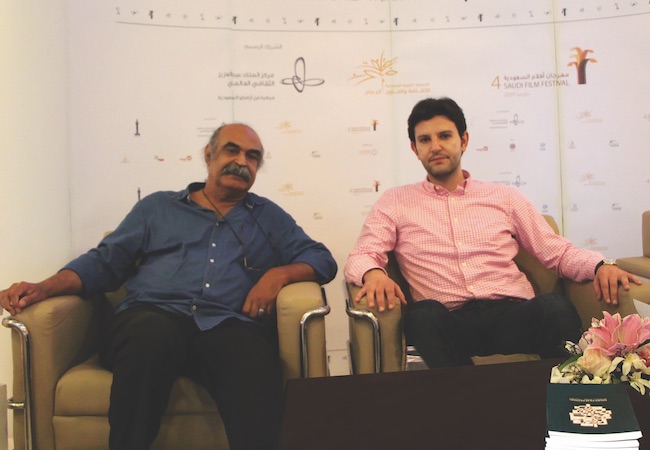Woodman discusses poetry with Bahraini poet Qassim Haddad

By Alexander Woodman
Poetry is one of the most powerful instruments to express one’s inner world. It is an art, which acts as a conduit to transform words into meaningful and purposeful expression. It is an aspiration for those who cannot otherwise express themselves freely and overtly. These are people who have unwilling inspired in themselves the depth of their inner world.Poets are personalities who can inspire and influence others to discover their poetic potential. When the moment of transformation occurs, it is quite a miracle. It is akin to a rebirth in the life of an individual.
In Bahrain, Qassim Haddad, is a global poet extolled by the locals. I had an opportunity to discuss poetry with this legendary Arab poet in his homeland. The conversational journey I had with him was a peaceful experience into the soul of humanity. His poems bridge the past, current time, and the future. He seems to give a new meaning and life to the daily and commonly used words.
A.W. What makes Arabic poetry/literature unique in comparison to Russian, Persian, or other ethnic poetry?
Q.H. I have read many forms of poetry from many different cultures. I read either the translated or transcribed forms. I observed that the Arabic language is unique. Unlike the Latin languages, it has not changed. The language has maintained its original form carrying with it the Arabic heritage, as it courses its way through one generation to the next. The Arabic language is profoundly descriptive and melodious by nature. It is suitable for poetry, because this art requires a colorful, rhythmic, and an extensive vocabulary to express itself. Due to the language, Arabic poetry has been mistaken for music to listeners abroad.
A.W. How significantly is the role of poetry to our life?
Q.H. Poetry is a way of life. It is not just the text. Rather, poets view the world with a sense that differs from most people. They use their poetic sensuality to interpret their interactions with everything in their environment.
A.W. Do you think people are born poets, or can they train to be poets?
Q.H.It is a combination of both factors. My generation, those born in the 50s and 60s, were born into poverty because of the socio-economic crisis. We had to work to earn a living. Many did not have the luxury to study literature and poetry at the academic level. Nonetheless, for those of us who had an aptitude for poetry, we were able to excel in it. Despite the hardship, I was fortunate to come from an educated and religious household, which could afford to give me an official education. Regardless of our background and challenges, we appreciated the life we experienced.
A.W. How does the new generation, especially the 20 and 30-year-old Bahrainis, feel about poetry? Do you think they care about it, or are they more interested in the social media?
Q.H.The problems with the readers of the new generation are two folds. Firstly, academic institutions (universities) tend to focus on poetry and literature of the old rather than modern poetry and literature. Consequently, this generation believes there is nothing to seek, because the subject is irrelevant to them. Therefore, they seek online sources. Unfortunately, these sources are of average quality; they lack professionalism. This is a far cry from the poetry currently available.
A.W. Do you think universities should offer poetry classes, or it is up to the individual to develop this skill? From your own experience, you developed the skills through a self-taught process. Should those who are interested follow your lead, instead of relying on a traditional academic institution?
Q.H.I would like to think that the challenge with modern poetry lies with the audience. It is a small group within a limited audience. Notably, the audience learns about poetry within the confines of their homes. It is passed from one generation to the next. Basically, the educational infrastructure does not reflect, or represent their cultural roots and identity. Therefore, most students tend to neglect and ignore modern Arabic literature and poetry. While the advancement in the publishing industry has made some inroads to improve, disseminate, and promote poetry, the readers and audience of modern poetry leave a lot to be desired. Although, globally, some people show interest in poetry, especially in the English language, they are unlikely to be interested in Saudipoetry.




